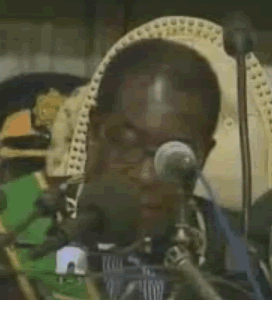Zimbabwe is a nation of beef. People produce it and people love to eat it. Perhaps you could say that beef is part of a Zimbabweans identity. But the tides changed. At Spar they sell not beef but beef fat. Not a speck of meat included, just the fat. And for the astronomical price of ZWD240,000 per kg.
Zimbabwe is a nation where liberation war credentials have long been considered essential in legitimizing a politician, part of their identity. One of the many places this political ethos has been enshrined is through use of comrade in front of politician’s names. Perhaps a new era is on the horizon. It will be interesting to see if the new government yields Prime Minister Tsvangirai or Comrade Tsvangirai.
Zimbabwe is a nation whose literature has centered on the liberation war. However, now it’s become harder to see this theme or any singular theme across Zimbabwean literature. Thus, an identity crisis and the question: What are current works collectively trying to say and do? It’s not necessarily a bad thing, a literary identity crisis. In fact, topically wide-ranging literature emerging out of one nation is a sign of vibrancy and rich intellectual engagement.
Zimbabwe is a nation in which, not that long ago, donor funding was shifting. Decreasing was a dependency identity; things were moving away from handing out of basic goods and services. Increasing were activities and longer term planning to analyze and address the underlying issues driving need. Focus was increasingly and effectively the bigger picture questions. These days waned as recent advocacy around lifting the ban on humanitarian aid made painfully apparent how dependent the nation has become on donor programmes just to meet basic needs. As important as meeting basic needs will continue to be, equally as important is rejuvenating mindsets toward the bigger picture once again.
Zimbabwe is a nation waiting to see what directions the new government will go. Will it be a peaceful process allowing people to return to their beloved beef? Or will it be continued peddling of beef fat? I’m going to present the optimist stance. The challenges of how to get the beef (not the fat) are many and complex. Many of which revolve around (corruption-free) economic recovery. At the same time, it seems an identity crisis is in the air. It’s an awful lot, a real challenge for people to let go of past pains and broken promises, to trust and believe that the queues, shortages, black market, etc. culminating in the identity of resourceful survivor might be on its way out. But it seems part of ushering in change involves embracing the pending identity shift. To continue the fight and stand poised for beef–literally and in the form of partaking in vibrancy and rich intellectual engagements, which, when not suppressed and repressed, are at the core of Zimbabwe as a nation.










